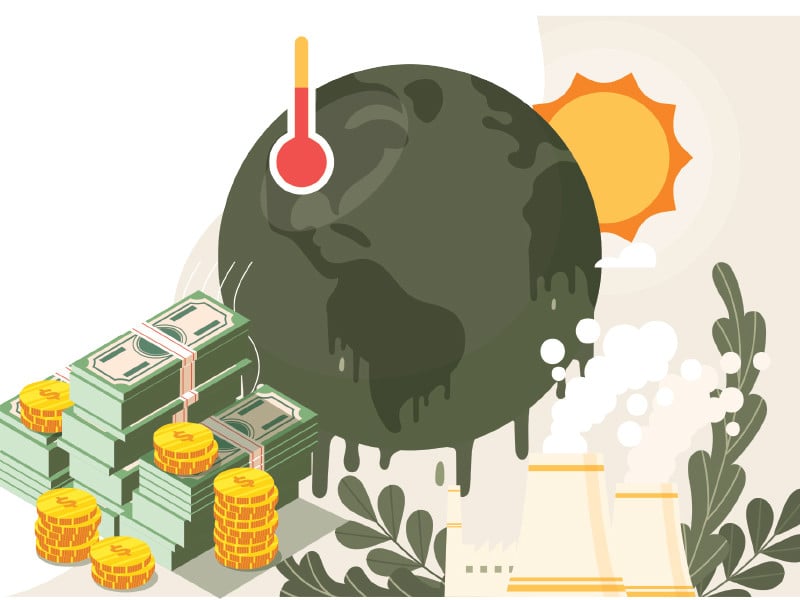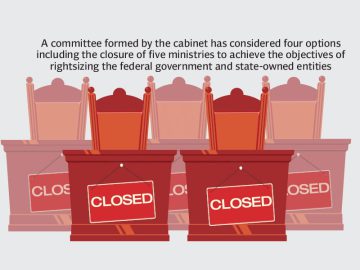ISLAMABAD:
In stark contrast with Pakistan’s worsening fiscal situation and rising public debt, the government approved 15 development projects on Tuesday, costing a total of Rs515 billion, including a $900 million foreign loan aimed at addressing climate change.
The Central Development Working Party (CDWP), which is responsible for sanctioning development projects, held a daylong meeting to consider 18 proposals. Among them were 15 development projects, one position paper, and two concept clearance documents for acquiring more foreign loans.
Of the 15, the CDWP approved 12 schemes, seven of which were forwarded to the Executive Committee of the National Economic Council (ECNEC) for final approval. The cost of the approved projects amounted to Rs265 billion, while the $900 million foreign loan proposal, equating to Rs250 billion, also received the green light.
The Ministry of Finance presented the concept note for seeking $900 million from the Asian Development Bank (ADB). According to the proposal, which the CDWP endorsed, the loan will be disbursed in two tranches. The first tranche is set at $400 million, though Pakistan has requested an increase to $500 million.
The government, heavily reliant on foreign loans, has even begun purchasing dollars from the local market due to international financial institutions’ reluctance to provide significant loans given Pakistan’s weak credit rating. The $400 million loan will be used for budget financing, but its stated purpose is to enhance Pakistan’s capacity to combat climate change.
The finance ministry stated that the $900 million loan is intended to trigger climate change-related reforms and build capacity. The second tranche of $500 million will be a contingent credit facility, to be disbursed in the event of a disaster. However, the Planning Commission raised concerns that Pakistan should not take on expensive loans for disaster relief and instead request concessional budget financing.
The $900 million Climate and Disaster Resilience Enhancement Programme (CDREP) funded by the ADB is designed to enhance Pakistan’s resilience to floods and other climate-related disasters. The loan will support institutional capacity building for strategic planning, preparedness, and response, along with developing a framework for disaster risk reduction and strengthening risk-layered disaster financing.
Pakistan’s Public Sector Development Programme (PSDP) is already bloated, with financing needs for approved projects amounting to approximately Rs10 trillion. Yet, the Planning Commission proceeded with considering new projects for approval.
UK Economist Stefan Dercon, in his “Home Grown Economic Plan of Pakistan,” recommended reducing the size of both the PSDP and future financing needs as part of a proposal to ensure Pakistan’s fiscal viability. However, the CDWP agenda reflected a business-as-usual approach, proposing projects that should typically fall under the routine responsibilities of various ministries.
The government also proposed an Rs8.6 billion initiative to construct an additional 104 family suites for Members of Parliament and their staff. The CDWP approved this project, disregarding concerns about Pakistan’s fiscal sustainability. The planning ministry noted that the CDWP recommended completing the project in two phases, with the first phase worth Rs4.1 billion to be completed by June 2025.
The Board of Investment proposed extending the China-Pakistan Economic Corridor (CPEC) project management unit scheme for another three years. Initially conceived for five years, the project has yet to achieve its intended objectives. The CDWP approved the revised project for establishing the CPEC Project Management Unit at a cost of Rs498 million.
This half-billion-rupee project aims to retain the existing workforce of the CPEC Secretariat. The new goal is to implement the Framework Agreement on Industrial Cooperation, a task that does not require additional staffing and should be the core responsibility of the Board of Investment. The Planning Commission objected to retaining 38 employees at a financial cost of Rs716 million over three years for a task that should not necessitate a separate project. During the first phase, the Board of Investment spent up to 666% more than the approved budget, according to the Planning Commission.
Another major project considered was the Rs122.2 billion up-scaling of the Green Pakistan Programme, aimed at enhancing natural capital through forest restoration, biodiversity conservation, and promoting carbon financing. The project intends to plant 3.3 billion trees, with a 50% sustainability rate, thereby adding 1.96 billion trees to the existing forest cover, according to the working paper.
However, the Auditor General of Pakistan has raised serious concerns over the poor execution of the first phase of the project. The Planning Commission recommended that the second phase should only be approved after addressing the auditor’s objections, which highlighted issues such as inadequate monitoring of forestry and wildlife activities and shortcomings in tree plantation.
The CDWP also cleared a Rs10 billion project to establish Danish schools in Balochistan. These schools of science and technology will be established over three years, despite education being a provincial matter under the constitution. The Planning Commission opposed the project’s approval due to constitutional concerns, but the Secretary of Education informed the forum that the National Economic Council has permitted such projects in underdeveloped areas, provided that the provincial government covers half of the cost. The Balochistan government has agreed to share the financing.
In addition, the CDWP approved a Rs1.6 billion project to establish the Federal Government College of Home Economics in Islamabad, and a Rs29.3 billion Green Line Bus Rapid Transit System (BRTS) project in Karachi. Another project, the rehabilitation of the SITE Industrial Estate in Karachi, was also approved.





